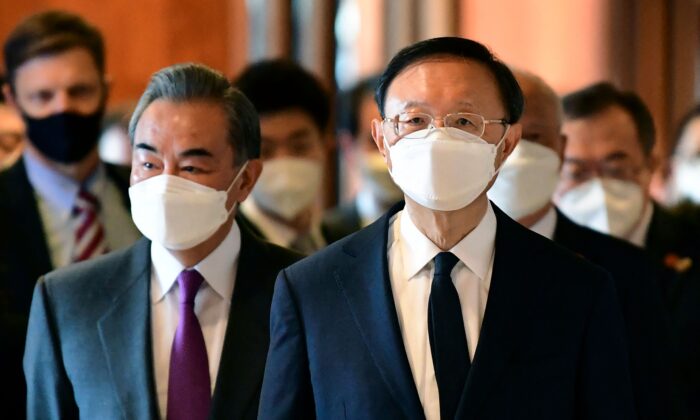US Falls Into 4 Traps Set by the CCP in US-China Talks


First, the holding of high-level talks between the United States and China is itself a CCP trap. ... Without substantial proposals (or concessions) from the communist regime, there would be no need for the United States to hold the meeting at all. Before the U.S. administration had any clear policy toward the CCP, it actually “invited” the CCP to come to the talks, falling into the “dialogue trap” set up by the CCP.
...
Secondly, Yang Jiechi broke diplomatic protocol by speaking for 16 minutes, which was eight times longer than usual, and his speech was obviously scripted. In particular, Yang said in his speech, “I don’t think the overwhelming majority of countries in the world would recognize the universal values advocated by the United States or that the viewpoint of the United States could represent international public opinion.” This is a clear indication that in the future the CCP will no longer abide by the rules set by the United States. ... The U.S. side, however, sat there obediently and listened to the end. American conservative commentator Jack Posobiec tweeted: “The obvious move would be for Blinken and Sullivan to stand up for the U.S. and kick out the CCP delegation after being disrespected. But they aren’t. They’re going back tomorrow to lose even more face. Hard to say how they could be any worse at this.”
...
Thirdly, Yang Jiechi drew a “red line” for the U.S. side, not the other way around. ... Yang declared [their human rights issues] are all China’s internal affairs and that the communist regime “firmly opposes U.S. interference.” According to Yang, “What the United States should do is to … mind its own business … rather than making irresponsible remarks about China’s human rights and democracy.”
...
The fourth trap lies in the U.S. side’s intention to seek cooperation with the CCP, even when facing such fierce confrontation. After the talks, Blinken spoke at a press conference about very specific areas where the United States and China could cooperate. ... In addition, Biden administration officials said they were open to easing some of the visa restrictions imposed on Chinese citizens under the Trump administration. By doing so, the U.S. side swapped its offensive position with the CCP and willingly gave up its advantage.
...
Secondly, Yang Jiechi broke diplomatic protocol by speaking for 16 minutes, which was eight times longer than usual, and his speech was obviously scripted. In particular, Yang said in his speech, “I don’t think the overwhelming majority of countries in the world would recognize the universal values advocated by the United States or that the viewpoint of the United States could represent international public opinion.” This is a clear indication that in the future the CCP will no longer abide by the rules set by the United States. ... The U.S. side, however, sat there obediently and listened to the end. American conservative commentator Jack Posobiec tweeted: “The obvious move would be for Blinken and Sullivan to stand up for the U.S. and kick out the CCP delegation after being disrespected. But they aren’t. They’re going back tomorrow to lose even more face. Hard to say how they could be any worse at this.”
...
Thirdly, Yang Jiechi drew a “red line” for the U.S. side, not the other way around. ... Yang declared [their human rights issues] are all China’s internal affairs and that the communist regime “firmly opposes U.S. interference.” According to Yang, “What the United States should do is to … mind its own business … rather than making irresponsible remarks about China’s human rights and democracy.”
...
The fourth trap lies in the U.S. side’s intention to seek cooperation with the CCP, even when facing such fierce confrontation. After the talks, Blinken spoke at a press conference about very specific areas where the United States and China could cooperate. ... In addition, Biden administration officials said they were open to easing some of the visa restrictions imposed on Chinese citizens under the Trump administration. By doing so, the U.S. side swapped its offensive position with the CCP and willingly gave up its advantage.
